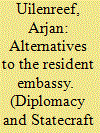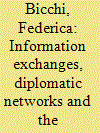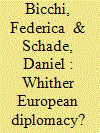|
|
|
Sort Order |
|
|
|
Items / Page
|
|
|
|
|
|
|
| Srl | Item |
| 1 |
ID:
132417


|
|
|
|
|
| Publication |
2014.
|
| Summary/Abstract |
Increasingly integrated in a common political entity, the European Union's member states are exploring new avenues to shape and maintain their mutual relations. This analysis describes three alternatives to the traditional resident embassy by which ministries of foreign affairs within the EU attempt to maintain diplomatic networks. The models discussed are secondments within member states' capitals, visiting ambassadors, and co-location and co-operation. In other words, with regard to different modes of representation, member states can consider diving in, stepping back, or pooling and sharing. These developments shed light on the ways in which the diplomatic machineries of the member states are trying to adapt to the demands of a "post-Westphalian" environment such as that of the EU.
|
|
|
|
|
|
|
|
|
|
|
|
|
|
|
|
| 2 |
ID:
132330


|
|
|
|
|
| Publication |
2014.
|
| Summary/Abstract |
This article analyses how, within the European Union foreign policy system, information is gathered and knowledge is constructed. The analysis is based on the evidence provided by a unique dataset, comprising the Heads of Mission reports between 1998 and 2010 and the EU member states' diplomatic networks. After distinguishing between information and knowledge, the article tackles three related aspects. First, it shows that the EU is able not only to favour information exchanges, but also to gather information and construct knowledge. Second, it argues that, while member states have an interest in contributing their own information and knowledge, European knowledge is also possible. This is demonstrated by means of an in-depth analysis of the preparation of the Heads of Mission report on East Jerusalem. Third, the article suggests that, depending on the reach of their diplomatic network, some member states are interested more than others in European information, but all member states are interested in European knowledge and in each other's interpretation of current affairs
|
|
|
|
|
|
|
|
|
|
|
|
|
|
|
|
| 3 |
ID:
184038


|
|
|
|
|
| Summary/Abstract |
The article analyses the evolution of European diplomacy over two decades, to assess the impact of the European External Action Service (EEAS) creation alongside consecutive waves of enlargement. Data is drawn from two original datasets about European Union (EU) member states’ diplomatic representations within the EU and across the globe. It shows that member states have maintained and strengthened their substantial diplomatic footprint across the EU’s territory, expanding it to include new members and making Brussels a diplomatic hub also for non-member countries. In parallel, and despite the establishment of the EEAS, member states have maintained and even increased their networks of diplomatic representations across the globe, alongside more numerous and more politically active EU Delegations (EUDs). At the same time, member states have been reducing their diplomats’ numbers, as the cases of Austria, France, Germany and Italy show. This delicate balancing act has been made possible not only by contemporary technological developments, but also by European cooperation, as in the case of EUDs hosting member states’ representations in non-member countries, a development referred to as co-location. Therefore, whereas the continued presence of national embassies on the ground could be interpreted as detracting from the EEAS, the existence of EUDs contributes also to other, more indirect but certainly novel, forms of diplomatic cooperation under a single European roof.
|
|
|
|
|
|
|
|
|
|
|
|
|
|
|
|
|
|
|
|
|